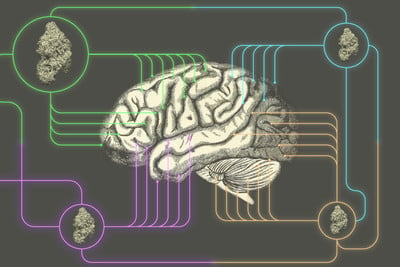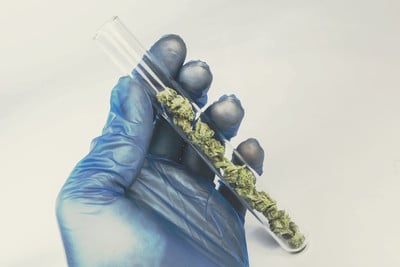Included FREE items

Marijuana and Epilepsy: What’s the Relationship?
Marijuana for epilepsy—a connection between the two has long been cited. But is there any merit to these claims? Below, we investigate whether cannabis could have a role to play in the treatment of epilepsy. Looking at both case studies and clinical trials, we'll see whether it's wishful thinking or indeed a groundbreaking treatment.
Contents:
How does marijuana affect epilepsy? Though the exact mechanisms are still under investigation, there is growing evidence that cannabis, or certain cannabinoids, may have a significant impact in the realm of epilepsy treatment. Indeed, CBD for epilepsy has experienced quite a lot of attention in recent years.
Whether cannabis alone or complex drug interactions are to thank for potential advances in epilepsy treatment, in either case, cannabis and epilepsy do appear to have a relationship. Or rather, cannabis appears to positively impact the lives of those suffering from epilepsy.
What Is Epilepsy?
Epilepsy is a mysterious condition. In fact, epilepsy could be better described as epilepsies, as it may be that many different brain conditions result in similar symptoms: seizures.
Though well-observed and fairly common, the causes of epilepsy remain elusive. As 1 in 3 epileptics has a close relative who shares the condition, this may suggest its origin lies in our genetic makeup. Nevertheless, identifying the gene responsible is proving difficult. Epilepsy can also be caused by brain damage, such as trauma, oxygen deprivation, or strokes.
According to the World Health Organisation (WHO), around 50 million people worldwide have epilepsy, making it the fourth most common neurological disorder after migraines, strokes, and Alzheimer’s. On the whole, it tends to be diagnosed in young people, or those over 60.
Simply put, epilepsy seems to be caused by what can be best described as uncontrolled “electrical bursts” in the brain, which trigger massive and random neuronal activity. These can range from mild and infrequent to massive and extremely recurrent. For some, epilepsy is a small part of life, while for others it can come to dominate every aspect of their existence, leading to serious inhibition.
Symptoms of Epilepsy
Epilepsy does not just cause “fits”, but has a range of symptoms. In fact, epileptic seizures are put into 9 different categories depending on their severity and symptoms:
| Simple partial (focal) seizures, or “auras” | General strange feelings, physical sensations, twitching |
| Complex partial (focal) seizures | Loss of awareness, uncontrolled movements, emission of strange noises |
| Tonic-clonic seizures (previously known as “grand mal”) | What most people assume is a typical epileptic seizure—the tonic part causes a loss of consciousness, stiffness, and collapse; the clonic part causes a physical fit |
| Absences | Loss of awareness, staring blankly into space, small twitches; most common in children, lasts up to 15 seconds |
| Myoclonic seizures | Full-body jerking, often soon after waking; lasts a very short amount of time, many can happen in quick succession |
| Clonic | All muscles twitch and jerk without seizing up at the beginning; loss of consciousness |
| Tonic | All muscles seize up |
| Atonic | All muscles relax completely; recovery is immediate |
| Status epilepticus | Any seizure that lasts a long time, or a string of seizures between which somebody does not regain consciousness |
| Simple partial (focal) seizures, or “auras” |
| General strange feelings, physical sensations, twitching |
| Complex partial (focal) seizures |
| Loss of awareness, uncontrolled movements, emission of strange noises |
| Tonic-clonic seizures (previously known as “grand mal”) |
| What most people assume is a typical epileptic seizure—the tonic part causes a loss of consciousness, stiffness, and collapse; the clonic part causes a physical fit |
| Absences |
| Loss of awareness, staring blankly into space, small twitches; most common in children, lasts up to 15 seconds |
| Myoclonic seizures |
| Full-body jerking, often soon after waking; lasts a very short amount of time, many can happen in quick succession |
| Clonic |
| All muscles twitch and jerk without seizing up at the beginning; loss of consciousness |
| Tonic |
| All muscles seize up |
| Atonic |
| All muscles relax completely; recovery is immediate |
| Status epilepticus |
| Any seizure that lasts a long time, or a string of seizures between which somebody does not regain consciousness |
Why Does Epilepsy Occur?
The causes of epilepsy are unknown. Though, as mentioned, the most common cause is thought to be genetic.
What is known is that epileptic seizures seem to be the result of bursts of electrical activity in the brain. Normally, electrical communication in the brain runs along predetermined neuronal pathways in a controlled manner. During an epileptic episode, however, this control seems to disappear, and electrical stimulation spreads from one neuron to the next in a chain reaction, causing a mass of uncontrolled activity.
Treating epilepsy can be very difficult, and can even involve separating the two hemispheres of the brain. It is estimated that 1 in 3 people with epilepsy will not respond to traditional drug treatments.
Traditional Epilepsy Treatments
Common treatments for epilepsy are:
- Anti-epileptic drugs (AEDs)
- Neuromodulation: Involves putting electrical devices inside the body that modulate neuron activity
- Ketogenic diets
- Brain surgery: There are many types of surgery for epilepsy; usually, they either identify the portion of the brain where the activity begins and remove it, or cut the Corpus callosum (the neurons that connect the two hemispheres of the brain) to stop seizures spreading from one half to another
Cannabis and Epilepsy
Claims of cannabis’ clinical potential are rife, and though sometimes overstated, they are being tested.
Regarding epilepsy, it appears that cannabis, and particularly the cannabinoid cannabidiol (CBD), may affect the lives of those who are drug or treatment-resistant.
According to the Epilepsy Society[1], randomised trials indicate that THC does not have anticonvulsant effects desirable for the treatment of epilepsy. Therefore, CBD is viewed as the primary cannabinoid of interest. This is especially true for children and young people, due to the potentially negative effects of THC on developing brains[2].
However, this does not mean that research into full-spectrum cannabis treatments should not be pursued.
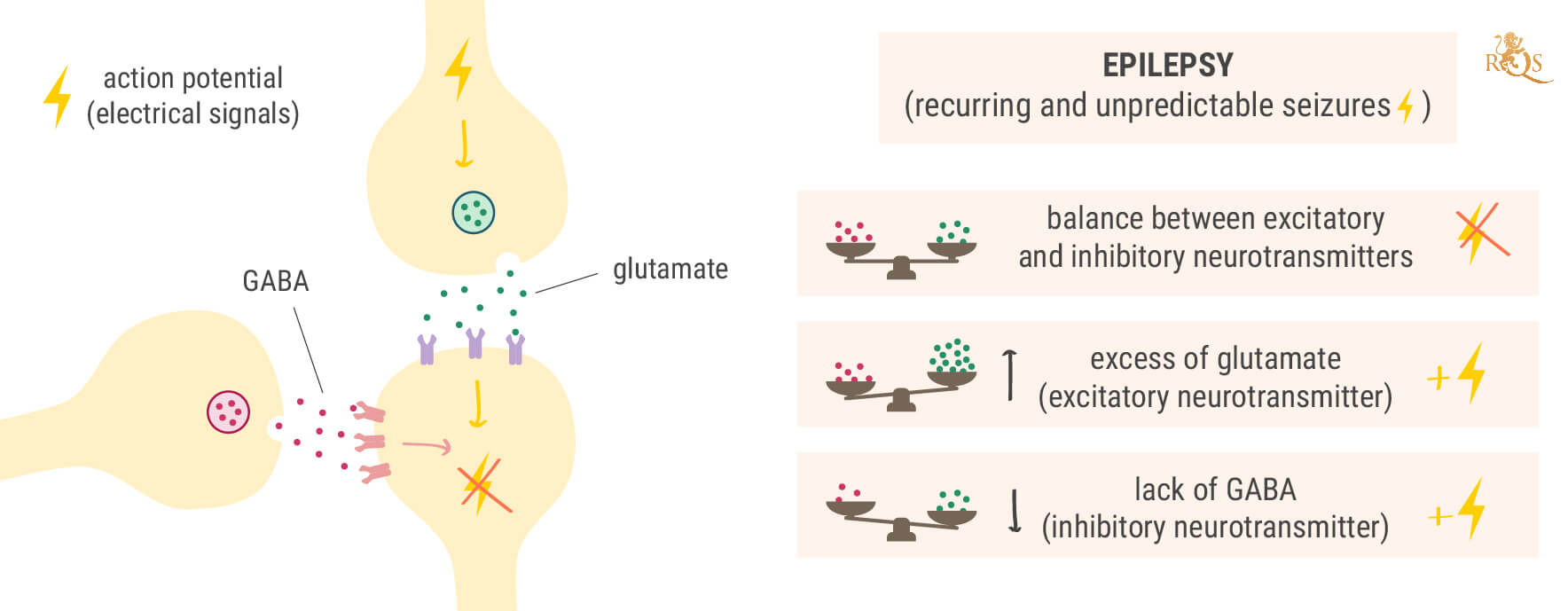
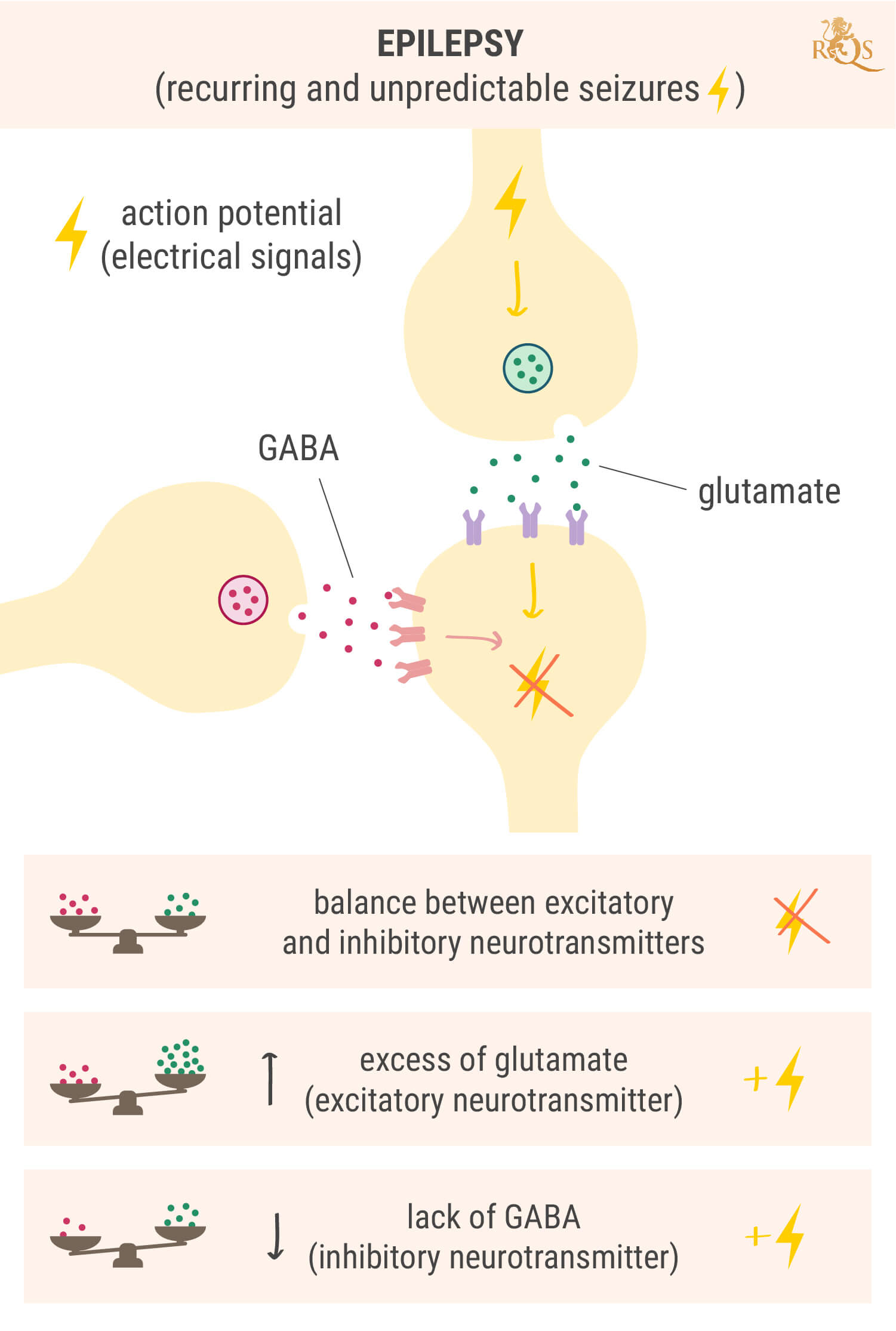
Cannabis Oil for Epilepsy in Adults
Both through self-medication and prescription via medical professionals, people around the world are turning to cannabis oil for epilepsy. For some, full-spectrum cannabis oils are used, for others, CBD isolates.
Among those who self-medicate, they are likely to use either readily accessible cannabis oils available from health shops or homemade cannabis oils. Among those prescribed, they will use medical-grade, approved and pharmaceutically produced solutions, such as Epidiolex. Though the purity of each product may vary, there is usually little difference between them. Though in some countries, medically prescribed cannabis oils may contain significantly more THC than readily available ones, or vice versa!
The Impact of Cannabinoids on Anti-Seizure Medication
In most clinical trials testing cannabis as a potential treatment for epilepsy, it is administered in conjunction with conventional epilepsy medications. Therefore, it remains to be seen whether cannabinoids alone produce anti-epileptic effects, or if they act as an adjunct or potentiator[3].
Further studies testing cannabis in isolation are required before we can determine its exact functions in epilepsy treatment.
CBD and Epilepsy
In recent years, CBD has soared in popularity, not least of all as a potential option for epilepsy patients. There are two main reasons for this.
For one, mainstream media outlets covered several stories of families using the cannabinoid for children experiencing severe forms of epilepsy. The jury is still out on whether CBD helps these conditions, but ongoing studies continue to test the cannabinoid in this context[4].
Except in rare cases, CBD has few side effects beyond drowsiness, while THC can cause anxiety, paranoia, and may even increase the likelihood of psychosis in young people. Given that many people suffer from epilepsy for their whole life, and as a result require treatment for their whole life, a non-psychotropic treatment will be greatly preferable for many.
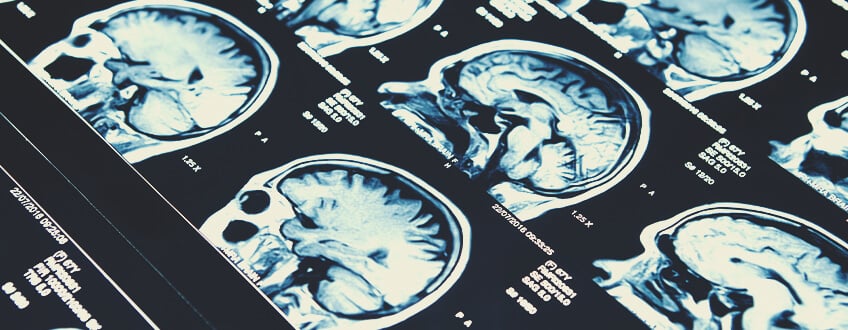
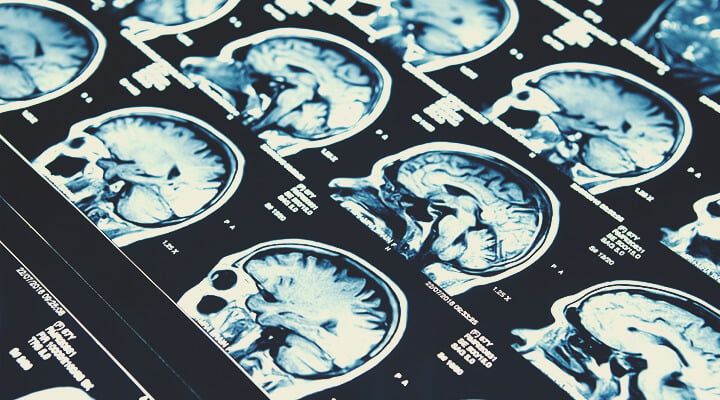
CBD in Cases of Childhood Epilepsy
CBD could have an impact on children with certain forms of treatment-resistant epilepsy. Lacking the psychotropic side effects of THC, it opens the door to non-invasive, addiction-free medications for young people.
In some countries, medical bodies have ruled out using CBD for children until further studies into its long-term effects have been conducted. In other nations, approved CBD medications are gaining a foothold.
Charlotte Figi: A Case Study
The case of Charlotte Figi was a monumental moment for those who hoped that cannabis would prove efficacious in the treatment of epilepsy. Figi suffered from a form of epilepsy known as Dravet syndrome, one that had proven to be treatment-resistant. In fact, prior to the administration of cannabis treatments, she suffered around 50 seizures a day.
Before going further, it should be noted that the cannabis product used to treat Figi contained both THC and CBD, not CBD in isolation.
With the assistance of a Colorado-based medical marijuana group, Figi’s mother began to administer cannabis as an adjunct to her other medications. Astonishingly, they observed a drop in the frequency of her seizures from 50 a day to 2–3 nocturnal seizures a month. Moreover, in the 20 months when this was observed[5], this reduction persisted.
In time, she was weaned from her other treatments until she was only using the cannabis treatments, with no reduction in efficacy. The researchers' observations suggest that a combination of THC and CBD may be more effective than either alone, though more research is necessary to validate this.
Though a magnificent example of the potential of cannabis for epilepsy, individual cases should not be used to make generalisations. Fortunately, more research is being conducted yearly, and we’re likely to see major advancements in the near future.
CBD for Dravet Syndrome and Lennox–Gastaut Syndrome
Dravet syndrome and Lennox–Gastaut syndrome are two of the more severe forms of epilepsy. Research[6] published in the Journal of Epilepsy Research in 2017 sought to determine if CBD impacts these conditions in any way.
This study looked at three high-quality placebo-controlled adjunctive-therapy trials that used purified CBD isolate alongside existing treatments, such as the drug clobazam. This research served as a huge step forward in CBD research, and has set the standard for future human trials investigating CBD for this purpose.
What Are the Risks of Marijuana for Epilepsy?
As mentioned, cannabis products are not without their side effects, especially those containing THC.
When assessing the risks of using marijuana in epilepsy treatment, the severity of the sufferer's epilepsy, their reaction to cannabis, and the effectiveness of other treatments must all be taken into account.
For some, cannabis treatments may present few side effects while potentially improving their quality of life. For others, the side effects may be severe with little to no positive gain.
Taking CBD-based formulas containing only trace amounts of THC is likely to mitigate the greatest risks related to cannabis. Moreover, taking it in the form of an oil or an edible presents far fewer risks than, say, smoking it.
Medical Marijuana vs Epidiolex
Epidiolex is, essentially, state-sanctioned CBD oil produced by a pharmaceutical company. The benefit of using it is that, due to the rigours of the pharmaceutical process, you can be almost certain of what it contains, whereas some over-the-counter CBD oils are of dubious purity at best. The downside is that it is heavily controlled at present, and impossible to access in many countries.
So, when deciding whether Epidiolex or medical marijuana is more suitable for you, accessibility is the first consideration. Can you even access the former?
Second, is it truly the most effective option? Research on cannabis is still young, and therefore the available treatments may well not be the most effective.
A Promising Future for Cannabinoids and Epilepsy
As research into cannabis progresses, we will isolate and identify the different functions of all the different cannabinoids—113 identified at the time of writing. While research is well underway into many of these—chiefly THC and CBD—others occur in trace amounts in the cannabis plant and are therefore very hard to isolate. However, there is no telling what they may offer us if we can harness them and unlock their full potential.
External Resources:
- Cannabis oil for epilepsy | Epilepsy Society https://epilepsysociety.org.uk
- Effects of Cannabis on the Adolescent Brain https://www.ncbi.nlm.nih.gov
- Epilepsy and Cannabis: A Literature Review https://www.ncbi.nlm.nih.gov
- Cannabinoids in the Treatment of Epilepsy: Hard Evidence at Last? https://www.ncbi.nlm.nih.gov
- The case for medical marijuana in epilepsy - PubMed https://pubmed.ncbi.nlm.nih.gov
- Cannabinoids in the Treatment of Epilepsy: Hard Evidence at Last? https://www.ncbi.nlm.nih.gov
Disclaimer:
This content is for educational purposes only. The information provided is derived from research gathered from external sources.






























